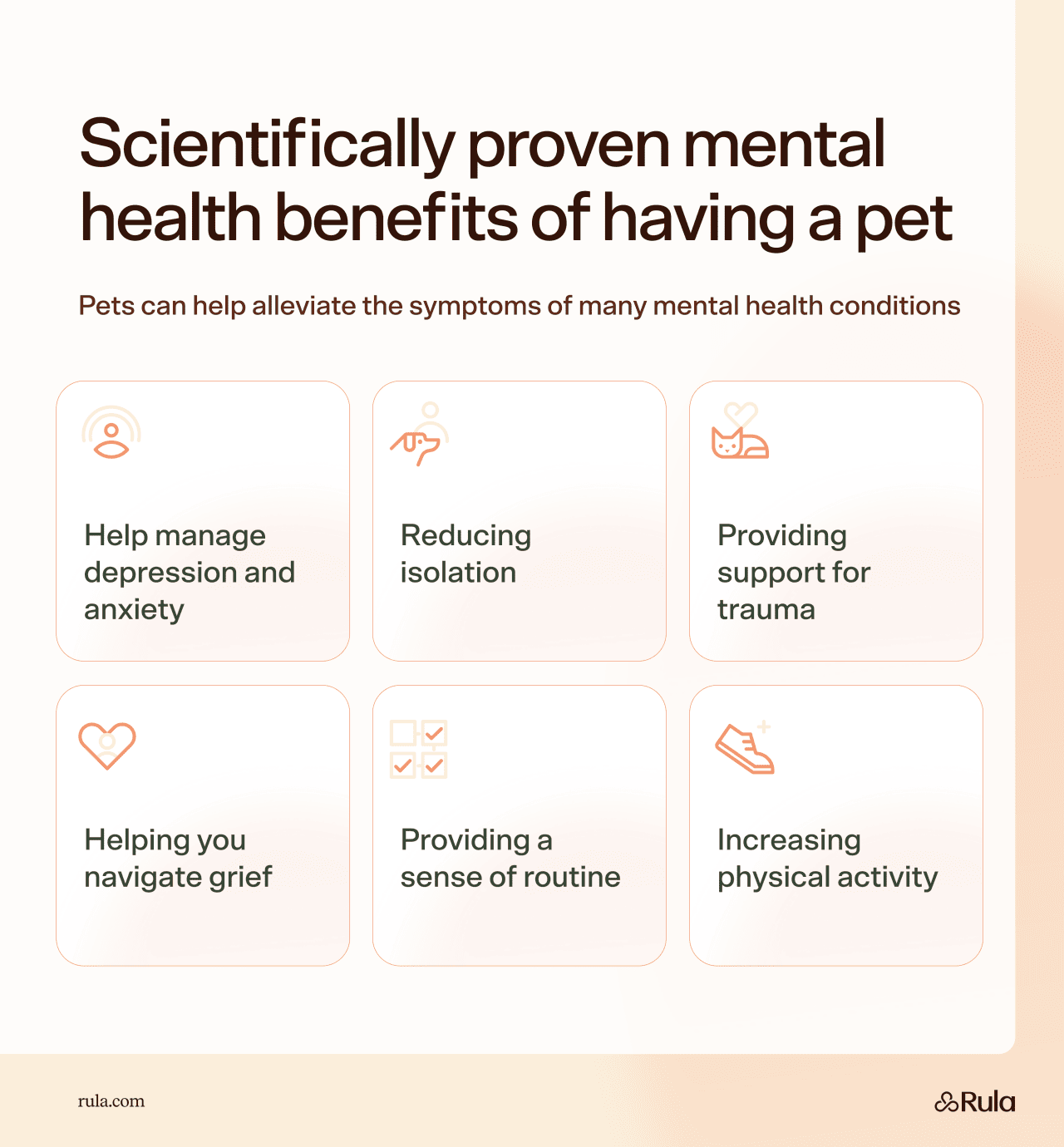Scientifically proven mental health benefits of having a pet
Published 5:00 pm Monday, July 21, 2025
Scientifically proven mental health benefits of having a pet
If you asked most pet owners, “Does having a pet impact your mental health?” you’d likely hear a resounding “Yes!” A 2023 survey found that the vast majority (86%) of pet owners believe their pets have a positive impact on their mental health. Respondents listed several key benefits to pet ownership, including:
- Reduced anxiety
- Companionship
- Unconditional love
- True friendship
- A calming presence
Most of us have witnessed the many positive effects of pets. Animals can provide a sense of purpose and emotional comfort in challenging times. From reducing stress and lowering your blood pressure to increasing physical activity and combating depression, research shows that having a pet can improve your mental health and physical well-being in many ways, Rula reports.
Key Takeaways
- Research shows many mental health benefits to having a pet. Pet ownership has been proven to help people living with conditions like depression, anxiety, PTSD, ADHD, autism, and more.
- In addition to their mental health benefits, pets can also help increase your physical well-being. Research shows that pet ownership is associated with more frequent exercise, greater mobility, and more time in nature.
- Most pets require a consistent caretaking schedule to stay healthy. Having a regular routine that includes tasks like feeding, grooming, walking, and playing can help you stay motivated and structure your day effectively.

Rula
If you have a pet, you may notice that they benefit your mental health by:
1. Helping you manage depression and anxiety
Trending
Research shows that pets you can interact with (like dogs, cats, and horses) can help people manage anxiety, depression, and other mental health conditions. It’s hypothesized that this is because their presence helps reduce stress and increase security.
In addition, taking time to care for a pet each day has been shown to give owners a mood boost that can make a big difference in their mental health.
2. Reducing isolation
Recent studies show that pets can help decrease two of the most challenging symptoms of a variety of mental health conditions: social isolation and loneliness. Pets naturally provide a sense of connection and companionship. They also invite social interactions you might not otherwise have. For example, while walking your dog, you might stop to chat with another dog owner or make a new friend at the dog park.
While pet ownership can’t take the place of professional help, an animal’s companionship can help you cope with life’s challenges and help you feel more connected to the world around you.
3. Providing support for trauma
Pets can be a source of emotional comfort and a calming presence for anyone. But for people living with post-traumatic stress disorder (PTSD), specially trained service dogs can be an important part of recovery. These incredible dogs can be trained to help their owners manage common symptoms of PTSD.
For example, they can interrupt flashbacks, apply physical pressure to reduce anxiety, or wake their owners up from nightmares. While the research on service dogs and PTSD is ongoing, studies have shown that service dogs can reduce symptoms, improve social interactions, and strengthen the mental health of people living with this condition.
4. Helping you navigate grief
Trending
In times of loss, our pets can be a lifeline of support. Their companionship can help us feel less alone and provide a sense of peace when the world feels confusing and dark. While pets can’t talk to us about our loss, research shows that they may be uniquely equipped to bring us comfort.
A 2021 study found that, while navigating grief, most people felt more satisfied with the support they received from their pets than the support they received from their families, communities, and mental health professionals.
5. Providing a sense of routine
Having a consistent routine can be an important part of maintaining good mental health — especially for people living with autism spectrum disorder (ASD) or attention-deficit disorder (ADHD). Most pets require a relatively consistent caretaking schedule, and people of all ages can benefit from this added consistency.
Tasks like walking, grooming, feeding, and playing can bring more structure and balance to your daily life. Having a pet can also help children learn important life skills and increase their confidence and self-esteem.
6. Increasing physical activity
Many pets require daily physical activity to keep their minds and bodies healthy. And the same is true for humans. On days when you might not feel like exercising, your pet can motivate you to get moving. Whether it’s walking or playing fetch with your dog, entertaining your cat, or riding your horse, animals encourage us to be more active.
Research shows that pet owners exercise more frequently, have better mobility, and enjoy more time in nature. This might be why pet ownership is associated with reduced blood pressure, cholesterol, obesity, and other health challenges. Keeping your body healthy with physical activity is a great way to keep your mental health strong.
Clinician’s take
“The benefits of pet ownership can fill the space between therapy sessions,” says Elise Miller, MA, LPC, clinical reviewer. “Your therapist does deep and powerful work with you during weekly or biweekly sessions, but what happens the rest of the time? A pet could add a sense of peace, companionship, and loving presence between sessions.”
This story was produced by Rula and reviewed and distributed by Stacker.
![]()





